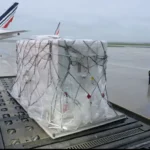GLOBAL SATELLITE OPERATORS ASSOCIATION RELEASES CODE OF CONDUCT ON SPACE SUSTAINABILITY

The Global Satellite Operators Association (GSOA) today released its Code of Conduct on Space Sustainability, calling on operators to implement responsible practices that mitigate the risk of in-orbit collision, minimize the threat of non-trackable debris, protect humans in space and limit effects on optical astronomy.
Satellite communications services provide essential connectivity that complements terrestrial networks and contributes to the delivery of universal service and coverage. Satellite connectivity can significantly help reduce today’s digital divide, as the number of satellite broadband users is set to double to at least 500 million people by 2030. “Satellites in all orbits deliver vital satellite connectivity and high throughput broadband services. While they offer great promises in bridging the digital divide, they must be launched, deployed, operated and disposed of in a responsible manner,” said Isabelle Mauro, the Director General of GSOA.
As the only CEO-driven satellite association in the world, GSOA – a global industry organization representing over 70 Members, with satellite operators in all orbits, launchers, suppliers and partners – takes the lead in addressing global challenges, seizing opportunities, and providing a unified voice for the satellite industry.
“The satellite industry has proven vital to helping bridge the digital divide and connect the unconnected, whether they are on land, at sea or in the air. These vital services depend on protecting and preserving access to space,” said GSOA Chairman Dan Goldberg, CEO of Telesat Corporation. “The development and industry-wide approval of the Code of Conduct is an important step in identifying best practices and mitigations to preserve access to space for future generations.”
“As the satellite industry continues to grow and is expected to bring socio-economic benefits worth more than US$250 billion globally, it is important that the industry works together to implement key sustainability practices that enable the world to continue benefitting from satellites,” said GSOA Vice-Chair, Ali Alhashemi, Group CEO of Yahsat.
Eva Berneke, GSOA Vice-Chair, CEO of Eutelsat Group said, “the Code of Conduct is a significant first step in safeguarding space resources. GSOA will continue to analyse additional matters and progress its work and efforts in this important area.”
The Code of Conduct endorses, and recommends that operators comply with practices in four space sustainability areas:
- Mitigating the risk of in-orbit collision: Operators should take all reasonable steps to share information with other operators about trackable debris that they may have or may not have generated through the operation of their spacecraft.
- Minimize the Threat of Non-Trackable Debris: Operators should take steps in the design, launch, orbit raising, operational and de-orbit phases of the spacecraft mission – to ensure that their satellites do not become debris.
- Preserving human life in space: Human life should be protected and operators should ensure that astronauts are not put at risk.
- Limiting impact on optical astronomy: Operators and astronomers should work together to minimise negative impacts on ground-based optical astronomy, while allowing observation at optical wavelengths and ensuring the delivery of satellite services.
Last Updated on 1 year by News Desk 1












